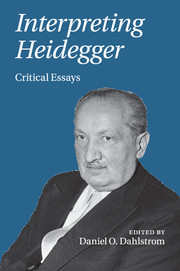Book contents
- Frontmatter
- Contents
- List of contributors
- Acknowledgments
- Method of citation and bibliography of Heidegger's works
- Introduction
- I Interpreting Heidegger's Philosophy
- II INTERPRETING HEIDEGGER'S INTERPRETATIONS
- III INTERPRETING HEIDEGGER'S CRITICS
- 11 Analyzing Heidegger: a history of analytic reactions to Heidegger
- 12 Lévinas and Heidegger: a strange conversation
- 13 Derrida's reading of Heidegger
- Index
- References
11 - Analyzing Heidegger: a history of analytic reactions to Heidegger
Published online by Cambridge University Press: 11 April 2011
- Frontmatter
- Contents
- List of contributors
- Acknowledgments
- Method of citation and bibliography of Heidegger's works
- Introduction
- I Interpreting Heidegger's Philosophy
- II INTERPRETING HEIDEGGER'S INTERPRETATIONS
- III INTERPRETING HEIDEGGER'S CRITICS
- 11 Analyzing Heidegger: a history of analytic reactions to Heidegger
- 12 Lévinas and Heidegger: a strange conversation
- 13 Derrida's reading of Heidegger
- Index
- References
Summary
The relationship between analytic and continental philosophy has been, let us say, a troubled one. For long stretches there has been no relationship to speak of, but rather two traditions operating independently, dismissing the other as either dry tedium or barren obfuscation. When contact was made, it has often been for analytic philosophers to hold up various continental figures as demonstrative of their field's intellectual emptiness. Hegel was the first occupant of the role of gibberish-spouter-in-chief, then Nietzsche had his day (aided by his posthumous appropriation by the Nazis), while Derrida has served more recently as a convenient scapegoat. Yet Heidegger, taking obfuscation to new heights from which he mounts attacks on logic and reason, may be the longest serving and most passionately impugned of them all. Analytic opinions are frequently formed, not on the basis of reading his work, but on reports given by those stalwart enough to venture into his writings. In this essay, I discuss four points of contact between the traditions, the first three being moments when significant analytic philosophers wrote on Heidegger. It is these readings that have largely set the tone for standard analytic views of Heidegger.
GILBERT RYLE: A ROAD NOT TAKEN
Gilbert Ryle's 1929 review of Sein und Zeit in Mind is a fascinating document. What may surprise contemporary readers raised in the wake of the analytic-continental split the most is how little this distinction figures into Ryle's thinking.
Keywords
- Type
- Chapter
- Information
- Interpreting HeideggerCritical Essays, pp. 235 - 255Publisher: Cambridge University PressPrint publication year: 2011
References
- 1
- Cited by

